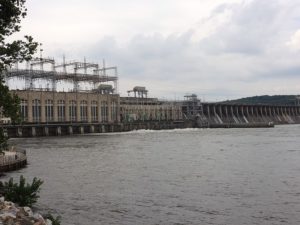@BryanRenbaum
Republican and Democratic lawmakers joined clean-water advocates on Wednesday to declare their support for emergency legislation that would prohibit Maryland from waiving a water-quality certification in a settlement agreement with energy company Exelon for a 50-year federal license to operate the Conowingo Dam.
The legislation would effectively compel the state to withdraw from the settlement agreement. Exelon and the Maryland Department of the Environment signed the pact on Oct. 29, 2019.
The opponents to the agreement spoke ahead of a Senate Education, Health and Environmental Affairs Committee hearing on the legislation, which began at 1 p.m. EDT. The House Environment and Transportation Committee held a hearing on the legislation on March 4.
“My district is immediately downstream from the dam and we’ve been feeling the effects of what we call ‘the Conowingo effect’ — for many, many years. And I’m old enough to remember when it worked well and I’m old enough to remember now that it doesn’t work well,” Del. Jay Jacobs (R-Kent) said at a news conference at the Lowe House Office Building in Annapolis.
“We are very concerned that what I think was a fair deal in 2018 at $172 million was very specific to conditions that should be addressed — were virtually just wiped aside. And a maximum of two hundred million dollars put on the table for the next fifty years — half of which was in basically cash…is woefully short of where we need to be in addressing the issues that are what we call ‘the ‘Conowingo effect, ” — referring to the increased pollution in the bay that has resulted from the dam.
Del. Vaughn Stewart (D-Montgomery) said the agreement would harm both the Chesapeake Bay and Maryland taxpayers.
“This deal is a bad one and a terrible idea for every Marylander who cares about the bay and every Marylander who pays taxes…Allowing Exelon to receive federal licensing for the Conowingo Dam without receiving a water quality-certification poses a huge risk to Maryland’s existing longstanding restoration efforts in the Chesapeake Bay.

The Conowingo Dam separates Harford and Cecil counties. This is a view from Harford County. (Bohemian Baltimore/Creative Commons)
“Our waterways are basic public resources and should not be sold off to a private company for exclusive use without strong accountability measures in place. The current settlement agreement only requires Exelon to pay for one percent of what they need to contribute to adequately address the problem. And without the bill, Marylanders will be on the hook for billions of dollars of cleanup support over the next fifty years.”
Ted Evgeniadis, who is a riverkeeper on the Lower Susquehanna River, echoed similar sentiments to the panel.
“The settlement behind this dam has the ability to make null and void all the investments Maryland has made over the years and that will just come from one storm event. It’s unfortunate that it’s now a political game and the losers are the taxpayers and anybody who makes a living off the bay in the state of Maryland. The people of Maryland will suffer from this settlement agreement and we hope for a favorable outcome.”
The large hydroelectric dam is located in Cecil and Harford counties on the lower Susquehanna River. The river is located about 10 miles from the mouth of the Chesapeake Bay. The dam opened in 1928 and has 53 flood control gates.
The dam used to trap many of the nutrients flowing down the Susquehanna River — the bay’s largest tributary — effectively cutting off their path toward the bay. But the dam’s 9,000-acre reservoir is now filled with sediment, and most nutrients bypass it— going on to pollute the bay.
The legislation, HB1465 and SB955, would, according to its text, prohibit “the state from entering into an agreement that waives the state’s authority under § 401 of the federal Clean Water Act as part of exercising the state’s authority and carrying out the state’s duties under the federal Clean Water Act and State law, including the state’s authority and duties related to the federal relicensing of the Conowingo Dam.”




Recent Comments